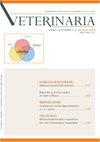Pautas para la vacunación en caninos y felinos en Uruguay
Q4 Veterinary
引用次数: 0
Abstract
espanolLa vacunacion es una herramienta ampliamente utilizada en medicina veterinaria para la prevencion de determinadas patologias infecciosas en animales de compania. Debido a la necesidad de unificar conocimientos cientificos y recomendaciones sobre su uso, se elaboro esta guia con pautas basadas en la epidemiologia de las enfermedades en Uruguay y la disponibilidad de vacunas comerciales para su implementacion. Las vacunas de pequenos animales se dividen en esenciales y opcionales. Las esenciales previenen enfermedades de distribucion mundial potencialmente mortales y deben ser administradas a todos los animales, apuntando a lograr una inmunidad poblacional. Las vacunas opcionales deben ser administradas a los animales cuya area geografica, medio ambiente o estilo de vida los exponga a enfermedades especificas. Existen varios factores que pueden interferir con la inmunizacion activa, entre ellos se encuentra los anticuerpos maternales en cachorros, las parasitosis concomitantes, el uso de ciertos farmacos y la senescencia del sistema inmune. Las vacunas son productos biologicos seguros, pero no estan exentos de provocar reacciones adversas en el organismo en situaciones muy particulares, siendo generalmente ademas autolimitantes. En esta guia se proponen diferentes planes de vacunacion para los animales de compania segun su edad, asi como se establecen pautas para la vacunacion en refugios de animales. La misma se realizo considerando las ultimas recomendaciones internacionales, apoyandose en el conocimiento cientifico disponible y la realidad del Uruguay en cuanto a la epidemiologia de las enfermedades. De esta manera, se pretende auxiliar a los profesionales veterinarios para hacer el mejor uso de las vacunas, de forma optimizada y segura EnglishVaccination is a widely used tool in veterinary medicine for the prevention of defined infectious diseases in pets. Due to the need of unifying scientific knowledge and recommendations on its use, this guide was developed with guidelines based on the ep-idemiology of diseases in Uruguay and the availability of com-mercial vaccines for its implementation. Small animal vaccines are divided into core and non-core. The core vaccines prevent from worldwide distributed life-threatening diseases and must be administered to all animals, aiming to achieve herd immuni-ty. Non-core vaccines should be administered to animals whose geographic area, environment or lifestyle, exposes them to spe-cific diseases. There are several factors that could interfere with active immunization, including maternal antibodies in puppies, concomitant parasitosis, the use of certain drugs and senescence of the immune system. Vaccines are safe biological products, but they are not exempt from causing adverse reactions in particu-lar situations, though they usually are self-limiting. This guide proposes different vaccination plans for pets according to their age, as well as a guidelines for shelters vaccination. It was car-ried out considering the latest international recommendations, based on the available scientific knowledge and the epidemio-logical information in Uruguay. In this way, it is intended to help veterinary professionals to make the best use of vaccines, in an optimized and safe way乌拉圭犬和猫的疫苗接种指南
西班牙疫苗接种是兽医学中广泛使用的一种工具,用于预防伴侣动物的某些传染病。由于需要统一关于其使用的科学知识和建议,本指南根据乌拉圭疾病流行病学和可获得的商业疫苗制定了指导方针。小动物疫苗分为基本疫苗和可选疫苗。基本药物可预防世界范围内的危及生命的疾病,应在所有动物中使用,以实现群体免疫。可选疫苗应适用于地理区域、环境或生活方式使其易患特定疾病的动物。有几个因素可能干扰主动免疫,包括幼犬的母体抗体、伴随的寄生虫病、某些药物的使用和免疫系统的衰老。疫苗是安全的生物产品,但在非常特殊的情况下,它们也不能避免在体内引起不良反应,而且通常是自我限制的。本指南根据宠物的年龄提出了不同的疫苗接种计划,并建立了动物收容所的疫苗接种指南。这项研究是根据最新的国际建议,根据现有的科学知识和乌拉圭在疾病流行病学方面的现实情况进行的。通过这种方式,它旨在帮助兽医专业人员以优化和安全的方式最佳地利用疫苗,英语疫苗接种是兽医医学中广泛使用的工具,用于预防宠物的确定传染病。由于需要统一关于其使用的科学知识和建议,本指南是根据乌拉圭疾病流行病学和可获得用于实施的商业疫苗的指导方针制定的。小动物疫苗分为核心疫苗和非核心疫苗。核心疫苗可预防全球分布的危及生命的疾病,必须对所有动物使用,以实现畜群免疫。非核心疫苗应适用于地理区域、环境或生活方式使动物易患特定疾病的动物。There are若干因素可干涉with active徙,包括puppies年孕产妇antibodies concomitant寄生虫,the use of某些毒品和senescence of the immune system。疫苗是安全的生物产品,但在特定情况下也不能避免引起不良反应,尽管它们通常是自我限制的。本指南根据宠物的年龄提出了不同的疫苗接种计划,以及庇护所疫苗接种指南。它是根据乌拉圭现有的科学知识和流行病学信息,考虑到最新的国际建议而制定的。通过这种方式,它旨在帮助兽医专业人员以优化和安全的方式充分利用疫苗。
本文章由计算机程序翻译,如有差异,请以英文原文为准。
求助全文
约1分钟内获得全文
求助全文
来源期刊

Veterinaria
农林科学-兽医学
CiteScore
0.10
自引率
0.00%
发文量
21
审稿时长
>12 weeks
期刊介绍:
VETERINARIA is the official scientific journal of the Italian Companion Animal Veterinary Association (SCIVAC) and is published bimonthly by Edizioni Veterinarie (E.V.). Its aim is to promote the spread and development of new ideas and techniques in the field of clinical and veterinary practices, with the ultimate goal of improving and promoting the continuing education of veterinary practicioners. VETERINARIA publishes literature reviews, original articles, diagnostic corners and clinical cases on different topics related to medicine and surgery of the dog, cat and of other companion animals, as well as short communications from congresses.
 求助内容:
求助内容: 应助结果提醒方式:
应助结果提醒方式:


